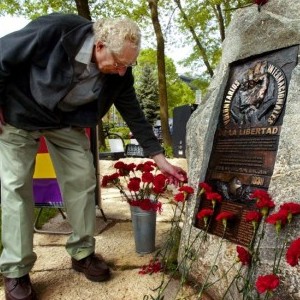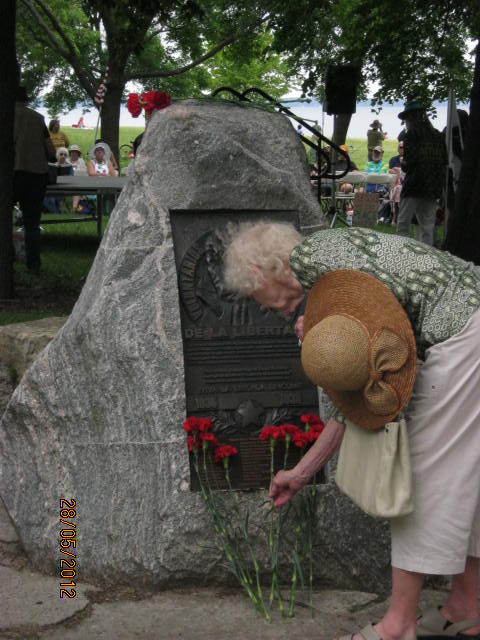On Memorial Day this year, I spoke at a rally organized by the Clarence Kailin chapter of the Veterans for Peace in Madison, Wisconsin. It’s like an annual family gathering for progressives in Madison. Particularly sweet for me, the event was held at the tiny, historic Gates of Heaven Synagogue, where I was married on a summer day almost 17 years ago.
The day before the event, I asked my dad what he thought I should say.
Being a visual artist, his answer was to take me down to Olbrich Park to drive the Vets for Peace Memorial Mile. Every year, veterans set up small white tomb stones along the edge of the park, in memory of the more than 6,675 U.S. soldiers who have lost their lives in Iraq and Afghanistan since 2001. It’s a powerful statement, that annual display, there in the heart of a peaceful weekend scene. As you drive past, the gravestones flow by in long, silent rows, past the tennis and basketball courts, past kids playing and joggers trotting past, with the dome of the state Capitol shining across the lake. They are a reminder of the terrible price of the wars being fought in our name, far away from our everyday lives.
My dad and I drove to the end of the park, turned around in a parking lot and drove back past those 6,675 tomb stones. It was raining on and off, and the sun was bursting through the clouds, intermittently lighting up the raindrops on our windshield./ We had just reached the top of the hill at end of the park when a big rainbow appeared in the sky, stretching from horizon to horizon, framing those glowing grave markers in the park below. And then we drove home.
Sometimes words are not enough.
One of the great problems with being a citizen of the American Empire is that the violence waged in our name has so far outstripped our language and logic, and the ability of our verbal, rational minds to grapple with what we are talking about when we talk about war. The political and tactical explanations for war, the sterile-sounding terminology—none of that helps. All those dead. How can you begin to rationalize it? Our longtime columnist, the late, great people’s historian Howard Zinn wrote:
“Memorial Day should be a day to honor all those people striving for peace, including those men and women who have come back from Iraq and called for an end to the war and the occupation.”
Zinn, who flew bombing missions over Europe as a World War II pilot, was invited to participate in a panel of veterans telling “war stories” to dedicate the World War II memorial in Washington, DC, back in 2004. He startled his audience, he wrote in The Progressive, by declaring: “World War II is not simply and purely a ‘good war.’ It was accompanied by too many atrocities on our side.” One of those atrocities—the atomic bomb the United States dropped on Hiroshima—was in the news this week, as President Obama became the first sitting President to visit the bombing site. Obama called for “a world without nuclear weapons,” and honored those who died. There was a lot of political debate about whether the President would apologize to the people of Japan (he did not). His visit reignited debate about whether the atomic bomb was “necessary” to end the war (we have published a fair amount of scholarship showing that it was not).
But here again, words are inadequate.
The symbolism of Obama’s visit, and the image of his embrace of a survivor of the bombing, was far more significant than any policy discussion to come out of that trip. The Unites States maintains its nuclear stockpile, and we are still engaged in a seemingly endless, murky War On Terror. But a moment of human contact and empathy at the Hiroshima memorial—two men, heads bent, embracing, one a U.S. President and one a target of the first atomic bomb our country dropped on a civilians in another land, was like a momentary burst of sun through the clouds. Policy talk about horror on the overwhelming scale of Hiroshima is almost always dramatically, dizzyingly diminishing. My freshman year in college I took a history class with a discussion section taught by an energetic young TA who said to us one day, “Quick show of hands—who would have dropped the bomb on Hiroshima?”
That moment stayed with me for years and years afterwards. I remember the eager freshmen around me—mostly boys—dutifully raising their hands and jumping into the debate. I don’t remember much about which positions they chose. What I do remember is the feeling that this was not so much a college course in history as it was a training session in absolutely stunning hubris. That “quick show of hands” method of thinking about war may be precisely the kind of training you need to be a future leader of a military superpower waging war around the globe. If you are too overwhelmed by the horror of war to engage in a “quick show of hands” debate, you can begin to feel quite alienated.
That’s why I am glad to work at The Progressive, where, for the last 107 years, we have failed to raise our hands to support U.S. military aggression. We’ve published Howard Zinn and Erwin Knoll and Kathy Kelly and other voices of reason and humanity that stand up to the macho nonsense and mechanistic, dehumanizing rhetoric of war. I had a chance to talk to Phil Straus, of the Straus Military Reform Project, after the Pentagon made its 2017 budget request: $582.7 billion in discretionary funding—a $2.4 billion increase over last year. $58.8 billion of that is for a general “war spending” slush fund created to finance the wars in Iraq and Afghanistan in 2001. It’s not subject to spending caps or regular scrutiny by Congress. Straus and his colleagues have been fighting for years just to get the Pentagon to submit to regular audits. Years ago they helped uncover the fact that more than $8.5 trillion doled out by Congress to the Pentagon since 1996 can’t be accounted for at all. We don’t even know how the money was spent.
Our military budget is a statement of seriously warped national priorities. Straus calls the latest budget a “Mardis Gras” for defense contractors. We don’t just spend ten times more than China, the next largest military power, we are burning the money on weapons that don’t work, some of it on we don’t even know what. Like the $300 million a year in unaccounted for spending on the national police in Afghanistan. That’s pretty troubling given our problems at home. Think Progress points out that with 1 percent of the military budget, we could purchase permanent housing for the nation’s 565,000 homeless. In fact, the Pentagon could make every homeless person in the United States a millionaire and still have money left over.
I was on a local radio show last week, when a woman called in to explain why she supports Bernie Sanders, and why she is completely disaffected from mainstream politics in this country. She talked about multinational corporations outsourcing jobs, and domestic and foreign policies that are making things worse for the people who live in her neighborhood. She described how one young man who lives nearby came back from Iraq with no face.She was stringing together these ideas—that our government serves the powerful and corporations, and that shrinking opportunity at home is related to our military adventurism abroad—and I could see the host and the conservative guest in the studio with me getting visibly impatient.
The way this woman was describing America is not at all the way our political leaders or TV pundits describe it. It’s not our shared language, it’s complicated, and it’s a downer. My conservative counterpart, when he finally got to respond, called it “incoherent.” But it wasn’t incoherent. In this political year the sense of anger and betrayal in that woman’s voice is something many Americans are feeling. You can feel like you are crazy and isolated thinking that way. Especially when it comes to far away wars, it’s much easier not to feel the heaviness of moral responsibility. Also, we are trained not to think about it, to push it aside, to rationalize warfare as somehow making sense, when the lived experience of it cannot be justified or made sense of.
Quick show of hands: Who would drop the bomb?
The level of sheer callowness we have to cultivate to keep living this way is breathtaking. I am grateful to be part of a progressive community that stands for peace, and that can create a response to war as moving and serious, and also beautiful, as that Memorial Mile on Lake Monona. I’m thankful for a Memorial Day tradition of gathering together to support each other in our work to bring our community and our country a little more sanity, humility, and peace.
Ruth Conniff is editor-in-chief of The Progressive Magazine.
 Momentous changes resulting from U.S. hegemony in the world will be described during this May 28 peace rally – sponsored by Chapter 25 Veterans For Peace in Madison.
Momentous changes resulting from U.S. hegemony in the world will be described during this May 28 peace rally – sponsored by Chapter 25 Veterans For Peace in Madison.

 EATURED SPEAKERS
EATURED SPEAKERS MUSIC/POETRY
MUSIC/POETRY